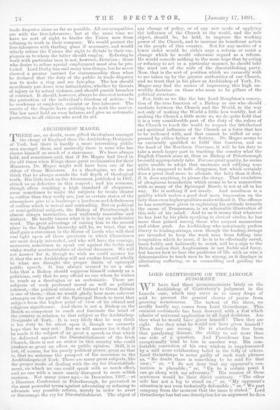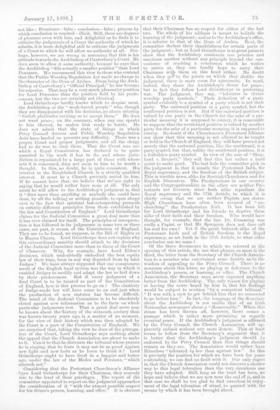LORD GRIMTHORPE ON THE ,LINCOLN JUDGMENT.
WE have had three pronouncements lately on the Archbishop of Canterbury's judgment in the Lincoln case, which may serve as so many drops of acid to, prevent the general chorus of praise from growing monotonous. The tartest of the three, we needly hardly say, comes from Lord Grimthorpe. This eminent ecclesiastic has been dowered with a test which admits of universal application to all legal decisions. Are they what he would have given himself ? Then they are right. Are they what he would not have given himself ? Then they are wrong. He is absolutely free from that paralysing disease, the ability to see more than one side of a question. And Providence has been exceptionally kind to him in another way. His com- fortable conviction of his own wisdom is supplemented by a still more exhilarating belief in the folly of others. Lord Grimthorpe is never guilty of such weak phrases as, " No doubt there is something to be said for that view ; " or, " I do not deny, that my opponent's con- tention is plausible ; " or, " Up to a certain point I can go along with my adversary." His version of these sentences would be their direct contrary. " The other side has not a leg to stand. on ;" or, "My opponent's situation is not even technically defensible ; " or, " We part company from the moment that the issue is stated." Lord Grimthorpe has but one description for an argument he does not like : Premisses—false ; conclusion—false ; process by which conclusion is reached—illicit. Still, there are degrees of pleasure even with him, and delightful as he finds it to criticise the judgments of a Court the authority of which he admits, it is more delightful still to criticise the judgments of a Court to which he will allow no authority at all. Per- haps, however, we are wrong in assuming that this is his attitude towards the Archbishop of Canterbury's Court. He 'does seem to allow it some authority, because he says that the Archbishop "fills actually a smaller position." than Lord Penzance. We recommend this view to those who contend that the Public Worship Regulation Act made no change in the character of the Dean of Arches. From being the Arch. bishop of Canterbury's " Official Principal," he has become his superior. That may be a very much pleasanter position for Lord Penzance than the position held by his prede- cessors, but the two are certainly not identical.
Lord Grimthorpe hardly knows which to despise most, the Archbishop or the " weak-kneed people " who, though they are disappointed with his decisions, go about uttering " foolish platitudes inviting us to accept them." He does not want peace ; on the contrary, when any one speaks to him thereof, be makes him ready to battle. He does not admit that the state of things in which Privy Council decrees and Public Worship Regulation Acts have landed us presents any difficulty. There was a proper Court and proper judgments, and all the clergy had to do was to obey them. That the Court was one which a Royal Commission has declared to be quite unsuited to the work it has to do, and whose juris- diction is repudiated by a large part of those with whose acts it is concerned, does not seem to him to be worth a thought. In this, no doubt, he is quite consistent. His interest in the Established Church is a strictly qualified interest. It must be a Church precisely suited to him. If he cannot have that, we believe that we are right in saying that he would rather have none at all. The only merit he will allow to the Archbishop's judgment is, that it " does more than anything or anybody else could have done, by all the talking or writing possible, to open sleepy eyes to the fact that spiritual law-interpreting proceeds on entirely different principles from those established by the law and Constitution of England." Lord Grimthorpe claims for the Judicial Committee a great deal more than it has ever claimed for itself. The principles of interpreta- tion it has followed in its judgments in some two or three cases, are part, it seems, of the Constitution of England. They are to be found, we suppose, in the 13i11 of Rights or in Magna Charta, Lord Grimthorpe does not explain why this extraordinary sanctity should attach to the decisions of the Judicial Committee more than to those of the Court of Chancery. Why, for example, have Lord Eldon's decisions, which undoubtedly embodied the best equity law of their time, been in any way departed from by later Judges ? We have always supposed that one conspicuous merit of the English legal system was the way in which it enabled Judges to modify and adapt the law as laid down by their „ predecessors. But if every judgment of a final Court is to be treated as part of the Constitution of England, how is this process to go on ? The elasticity of Judge-made, law will have come to an end just when the production of now statutes has become difficult. The mind of the Judicial Committee is to be absolutely closed against new information as to the facts on which particular judgments rest. That a great deal more may be known about theihistory of the sixteenth century than was known twenty years ago, is a matter of no moment, for the view of that history which was then adopted by the Court is a part of the Constitution of England. We are surprised that, taking the view he does of the preroga- tive of the Court,_Lord Grimthorpe says nothing about the appeal that the Church Association are about to make to it. Can it be that he distrusts the tribunal whose praises he is singing, that he fears it may not be as proof against new light and new facts as ho loves to think it ? Lord Grimthorpe ought to have lived in a happier and better age, under the law of the Medes and Persians, " which altereth not."
Considering that the Protestant Churchmen's Alliance "have Lord Grimthorpe for their Chairman, they scarcely rise to the level of their privileges. The report of the committee appointed to report on the judgment approaches the consideration of it " with the utmost possible respect for his Grace's person, learning, and office.' It is obvious that their Chairman has no respect for either of the last two. The whole of his address is meant to belittle the learning of the judgment ; and as to the Archbishop's office, it is inferior to that of the Dean of Arches. Next, the committee declare their thankfulness for certain parts of the judgment ; but as Lord Grimthorpe is at great pains to show that the Archbishop condemns one practice and sanctions another without any principle beyond the con- venience of reaching a conclusion which ho wishes to arrive at, they can hardly hope to carry their Chairman witli them on this head either. No doubt when they ge to the points on which they dislike the judgment, there is more room for agreement. In word, indeed, they share the Archbishop's desire for peace ; but in fact they follow Lord Grimthorpe - in preferring war. The judgment, they say, "tolerates in divine worship party symbols." Their definition of a party symbol evidently is a symbol of a party which is not their party. The eastward position is a party symbol, but the southward position is not. But if the eastward position is valued by one party in the Church for the sake of a par- ticular meaning it is supposed to convey, it is reasonable to suppose that the southward position is valued by another party for the sake of a particular meaning it is supposed to convey. No doubt if. the Churchmen's Protestant Alliance can show that this meaning is not allowed to be taught or held in the Church of England, they will have proved not merely that the eastward position, like the southward, is a party symbol, but that, unlike the southward position, it is a forbidden party symbol. In view of the case of " Shep- hard v. Bennett," they will find this last rather a hard point to make good. The last hole the committee pick in the judgment is, that it assails the Protestant faith, the Royal supremacy, and the freedom of the British subject. This is terrible news, alike for Scottish Churchmen and for English Dissenters. The Presbyterians in one country and the Congregationalists in the other are neither Pro- testants nor freemen, since both alike repudiate the Royal supremacy and the 37th Article, to which it is chiefly owing that we are neither Papists nor slaves. High Churchmen have often been accused of " un- ehurching " the Presbyterian Kirk, It has been left for Lord Grimthorpe and his friends to deprive them alike of their faith and their freedom, Who would have thought, for example, that the late Dr. Cumming was really a Papist, or that Mr. Spurgeon does not dare call his soul his own ? Yet if the great bulwark alike of the Protestant faith and of British freedom is the Royal supremacy, as set forth in the 37th Article, to what other conclusion can we come ?
Of the three documents to which we referred at the opening of this article, the one that pleases us most is the third, the letter from the Secretary of the Church Associa- tion to a member who entertained some doubts as to the wisdom of appealing to the Privy Council. There is no nonsense about this letter, no playing at deference to the Archbishop's person, or learning, or office. The Church Association, the Secretary says, never expected anything better from the Archbishop. The only reason for playing at having the cause heard by him is, that his findings would be subject to revision "by a competent tribunal." " It was with a view to get behind him that we consented to go before him." In fact, the language of the Secretary about the Archbishop is not unlike that of an Irish Nationalist newspaper about a " Removeablo." When this steam. has been thrown off, however, there comes a passage which is rather more promising as regards eventual peace. If the Archbishop's judgment is affirmed by the Privy Council, the Church Association will ap- parently submit without any more 'demur. This at least seems to follow from the Secretary's argument that it is better that the Archbishop's judgment should le endorsed by the Privy Council than that things should remain as they are. The Association would rather have Ritualism " tolerated by law than against law." As this is precisely the position for which we have been for years contending, we can find no fault with it. Our only regret is, that the Church Association could not discover a shorter way to this legal toleration than the very circuitous one they have adopted. Still, long as the road has been, we hope and believe that we are now near the end of it and in that case we shall be too glad to find ourselves in enjoy- ment of the legal toleration of ritual, to quarrel with the means by which it has been brought about.







































 Previous page
Previous page